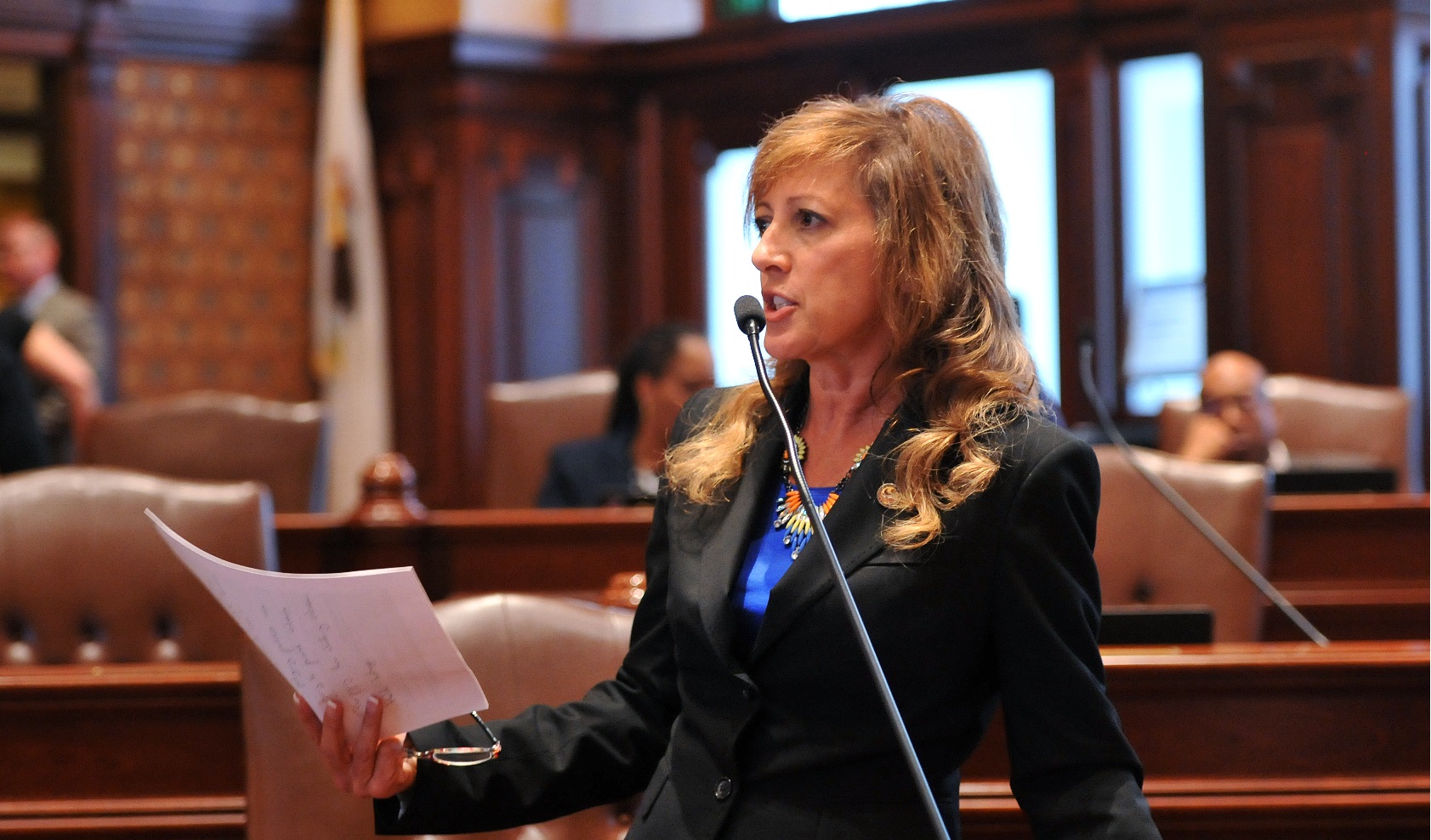- Details
- Category: Latest
Illinois Business Journal - July 2015 Issue | Original Article
By Dennis Grubaugh
In March, [Governor Bruce Rauner] appointed a 25-person bipartisan panel to explore ways to consolidate taxing bodies as well as reduce the number of unfunded mandates the state imposes on local communities.
He named Lt. Gov. Evelyn Sanguinetti to chair the task force.
...
The committee is charged with coming up with a set of recommendations by year’s end. While some recommendations may go nowhere, others are likely to become legislation, quickly or over a period of years. The committee discusses and votes on individual recommendations at each meeting, said state Sen. Linda Holmes, D-Aurora, a committee member and a longtime advocate of consolidation.
Meetings have focused about evenly between consolidation and unfunded mandates.
“There’s definitely been progress. There have been several meetings and a lot of conversation and public comment,” said Holmes, who was first elected in 2006. Discussions about the size and scope of government have grown in frequency in recent years, she said.
At the most recent meeting, the potential for debate, as well as agreement, was reflected. On one issue, panel members agreed that all of Illinois’ 102 counties should have the same ability that DuPage County has, which is the ability to recommend consolidations within its own county.
“A lot of the consolidation issues are being looked upon favorably,” Holmes said.
Another topic, though, showed the potential for disagreement.
“One of the items we voted on was reforming or eliminating prevailing wage. I voted no on it. I couldn’t see what prevailing wage had to do with either consolidation or mandates.”
Some unfunded mandates have their place, Holmes said. Physical education in schools, for instance.
“I’m not sure I want to leave that up to every individual school. Some would do an exemplary job, but I’m not sure all schools would do that. I want to make sure our children are getting the physical activity they need.”
She agreed that every recommendation regarding consolidation raises the potential for opposition because of jobs that could be lost.
“That’s a legitimate concern,” Holmes said. “And I think it needs to be weighed very carefully. But there may be a way of taking these issues and phasing them in over a number of years so you’re not causing an immediate effect.”
Read the full article at The Illinois Business Journal.
- Details
- Category: Latest
SPRINGFIELD — State Senator Linda Holmes spoke up in favor of a one-month temporary budget on the floor of the Illinois Senate Wednesday, and issued the following statement as Illinois state agencies faced shutdown for lack of a 2016 budget.
“I’m disappointed that Illinoisans will go without the services for which they have paid due to needless arguments over issues unrelated to the state budget,” Holmes said. “I have joined my colleagues in the Senate in presenting a budget to Governor Rauner in the hopes of reaching a compromise.”
“I ask the Governor now to set aside political matters and focus on fiscal matters. Every day he does not, our childcare centers face closure, our seniors face the possibility of having to leave their homes and all taxpayers face disruptions in their daily lives.”
Holmes voted in favor of a one-month provisionary budget that would keep essential state services in operation as lawmakers continue negotiating a full 2016 budget. The measure passed the Illinois Senate without Republican support. It proceeds to the House for consideration.
- Details
- Category: Latest
SPRINGFIELD — Women should not face cost barriers when considering whether to undergo a more thorough, 3D imaging process that can more accurately detect breast cancer, say Illinois Senate Democrats as new legislation works its way through the General Assembly to address women’s health needs.
“Increased access to more thorough, more modern forms of medical technology will mean fewer of our mothers and daughters and sisters taken from us by breast cancer,” said Senator Linda Holmes, D-Aurora.
House Bill 3673, which passed the Illinois House in April, would require 3D mammograms to be covered under women’s comprehensive health insurance plans. A related proposal, Senate Bill 54, sponsored by State Sen. John Mulroe, D-Chicago, requires annual three dimensional mammograms to be covered under women’s insurance plans.
Currently, insurance companies must cover an annual, flat image scan at regular intervals for women over 40. Such scans can potentially miss abnormalities, particularly in women with denser breast tissue. Three dimensional scans find 40 percent more invasive cancers than 2D scans and better visualize any abnormalities, according to the American Cancer Society.
Using the newer method gives doctors a clearer view and could eliminate mistaken diagnoses, Mulroe said.
“Breast cancer is deadly and devastating to families. Early detection not only saves lives and the related cost of future treatment, but it also eliminates the anxiety women experience waiting for the call back date,” Mulroe said.
The measures have met with broad support among Senate Democrats.
“It is critically important that women have access to breast cancer screenings,” said Senator Iris Y. Martinez. “Women have a much better chance of surviving from breast cancer if it is detected early.”
“It’s always important to me to support legislation that improves women’s access to health care,” said Senator Jacqueline Y. Collins (D-Chicago 16th), a co-sponsor of both measures. “Breast cancer is a leading killer of Illinois women, and early diagnosis is the key to successful treatment, so I applaud these efforts to connect all women – particularly those who are low-income – to regular screenings and the highest quality of care.”
“These proposals make cutting edge medical technology more accessible for more women,” said Senator Melinda Bush, D-Grayslake. “In the long run, that’s not just going to save money, it’s going to save the lives of our mothers and daughters.”
- Details
- Category: Latest
Rockford Register-Star – May 4, 2015 | Original article
By Brian Leaf
ROCKFORD — It's budget-approval month in Springfield. And when a spending plan is adopted, it could have a big impact on the historic downtowns of Rockford and four other cities, where a state incentive has kindled redevelopment investment and lots of interest in old, significant buildings.
That's the message proponents of Senate Bill 1642, which would extend the state River Edge Historic Tax Credit until 2022, sent south Monday during a Rockford hearing on legislation proposed by Sen. Steve Stadelman, D-Rockford. The bill is in the Senate's Revenue Subcommittee with other tax credit measures. The hearing was a way to elevate conversation about the importance of tax credits to River Edge cities: Rockford, Aurora, Elgin, Peoria and East St. Louis.
"We just need to get it discussed when major decisions are taking place," Stadelman said on why he hastily scheduled the Commerce and Economic Development Committee hearing two days earlier.
More than 30 states have historic tax credit programs. Illinois' 25 percent tax credit, which has resulted in $120 million in investment in Rockford's central city, doesn't expire until Dec. 31, 2016. But the date looms large for developers, who said that the 20 months left make it too risky to start a tax credit project because work may not finish — and building occupancy may not occur — by the New Year's Eve 2016 deadline.
Those who support renewing the tax credit program say the incentive has attracted interest from out-of-state developers, who will take their capital elsewhere if the program expires. Frantz Community Investors of Cedar Rapids, Iowa, already did. Last month, it rescinded a letter of intent to redevelop three downtown Rockford buildings. Mitch Hallgren, director of construction for Frantz, said his company will focus attention on historic renovations in Wisconsin and Iowa.
Representatives of Wisconsin-based Gorman & Company are feeling the tight deadline. The company plans to take ownership this month of the downtown riverfront Amerock/Ziock building and turn it into a $67 million hotel-conference complex. Renovation work begins this summer.
"A project this size, you don't want to be right on the periphery," said Andre Blakely, Illinois market president at Gorman.
Stadelman and Sen. Linda Holmes, D-Aurora, were the only two of 14 committee members at the hearing. Holmes urged people to write Gov. Bruce Rauner and ask him to support the program extension, which backers say turns vacant properties in distressed neighborhoods into tax-paying, job-producing businesses that give the state a $10 return on every $1 in tax credit it provides.
Tax credits are an important financial tool for developers. Property values have plunged 30 percent in Rockford since 2009, Mayor Larry Morrissey said. Banks won't lend money for redevelopment projects for that reason, but because of state tax credits, developers can make a project work.
"Private developers wouldn't be investing in cities without tax credits," he said.
Read more at RRStar.com.
More Articles …
Page 18 of 25





